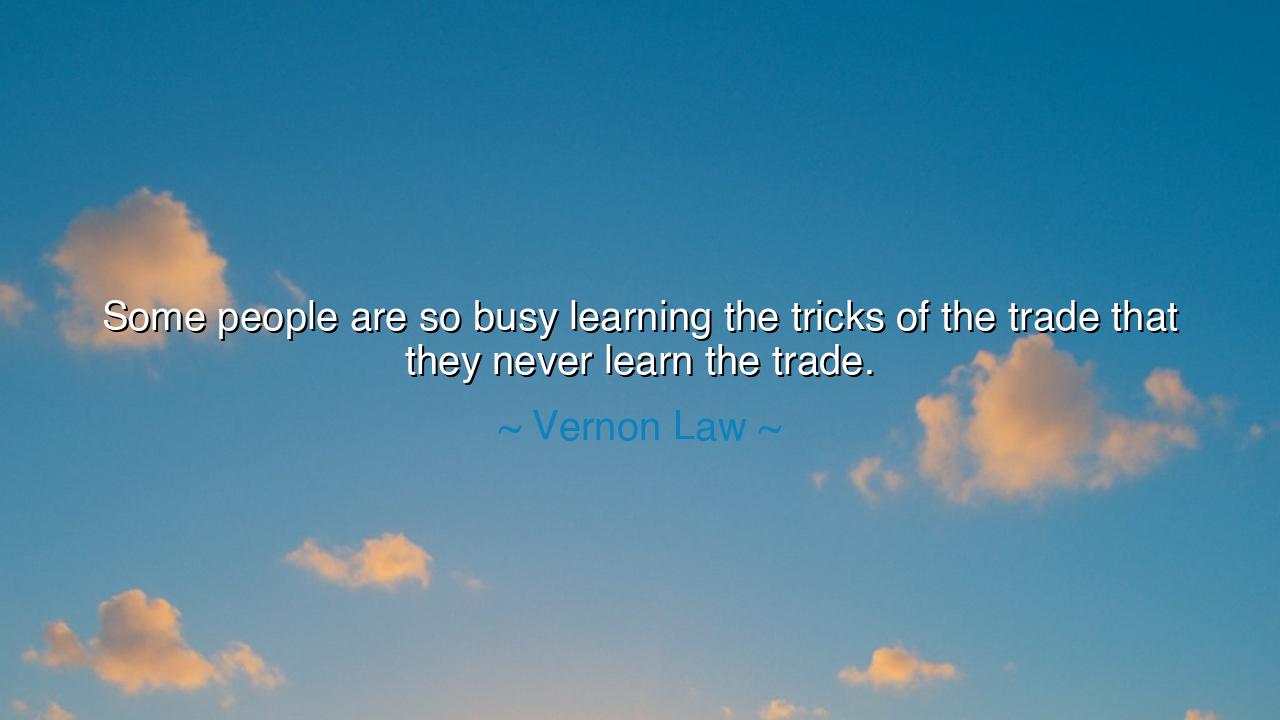
Some people are so busy learning the tricks of the trade that
Some people are so busy learning the tricks of the trade that they never learn the trade.






In the timeless and piercing words of Vernon Law, the great American baseball player and man of discipline, we find a truth that transcends the field of sport and reaches into the heart of all human endeavor: “Some people are so busy learning the tricks of the trade that they never learn the trade.” Within this statement lies a warning, as old as the mountains and as relevant as the dawn—it speaks of the folly of seeking shortcuts over mastery, of favoring illusion over substance. It reminds us that true greatness is never born from haste or deceit, but from patience, humility, and devotion to craft.
To understand this wisdom, one must first grasp the difference between tricks and trade. The tricks of the trade are the quick methods, the cunning strategies, the fleeting ways to impress or to gain without effort. The trade itself, however, is the deep art—the discipline, the understanding, the mastery that takes years to cultivate. Those who chase the tricks often appear clever for a moment but falter when the storm arrives, for they have built upon sand. But those who learn the trade—the essence and truth of their work—stand firm as the oak, whose roots reach deep into the soil of knowledge and experience.
Vernon Law, who spoke these words, knew the power of patience and the danger of vanity. As a pitcher, he endured pain, injury, and doubt, yet it was his dedication to the fundamentals—the rhythm of the throw, the study of the game, the endurance of long seasons—that carried him to success. He saw around him players who sought fame through flash rather than form, and he understood the eternal truth: that the path of mastery has no shortcuts. Every trade, whether of art, science, or life itself, demands sincerity of purpose. The one who seeks to rise without learning will fall swiftly, while the one who builds slowly will rise enduringly.
The ancients knew this well. The blacksmith did not become a master by learning tricks with the hammer; he became one by understanding the metal—its temper, its rhythm, its response to heat and pressure. The sculptor did not learn by finding shortcuts to carve faster, but by learning to see within the marble the form waiting to be freed. Likewise, the philosopher did not memorize clever words, but sought truth through struggle and reflection. In every art and every labor, the trade demands reverence, while the tricks seduce with pride. And pride, though bright, burns quickly and leaves nothing but ash.
Consider the story of Thomas Edison, who failed more than a thousand times before inventing the light bulb. Many mocked his persistence, asking why he wasted time on experiments that failed. But Edison understood the nature of his trade—each failure was not a loss but a lesson. When success finally came, it was not the result of tricks or luck, but of wisdom earned through labor. He himself said, “Genius is one percent inspiration and ninety-nine percent perspiration.” This is the same truth Vernon Law expressed—those who devote themselves to the process, not the performance, are the ones who illuminate the world.
The modern world, however, tempts us with illusions. We are told that success can be bought, that recognition can be faked, that knowledge can be simulated through cleverness. But these are the tricks that steal from us the joy of learning. The one who rushes to appear wise remains a fool; the one






AAdministratorAdministrator
Welcome, honored guests. Please leave a comment, we will respond soon